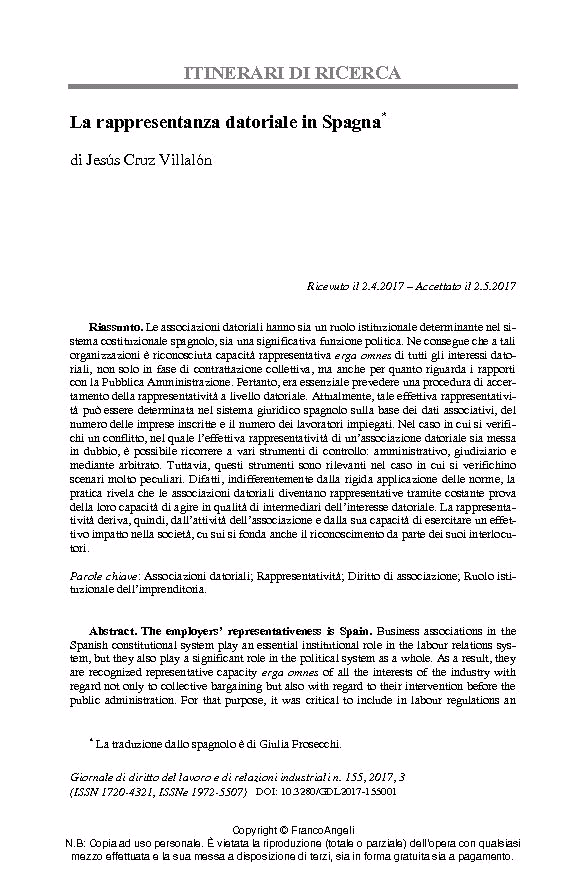La rappresentanza datoriale in Spagna
419-437 p.
Le associazioni datoriali hanno sia un ruolo istituzionale determinante nel sistema costituzionale spagnolo, sia una significativa funzione politica. Ne consegue che a tali organizzazioni è riconosciuta capacità rappresentativa erga omnes di tutti gli interessi datoriali, non solo in fase di contrattazione collettiva, ma anche per quanto riguarda i rapporti con la Pubblica Amministrazione. Pertanto, era essenziale prevedere una procedura di accertamento della rappresentatività a livello datoriale. Attualmente, tale effettiva rappresentatività può essere determinata nel sistema giuridico spagnolo sulla base dei dati associativi, del numero delle imprese inscritte e il numero dei lavoratori impiegati.
Nel caso in cui si verifichi un conflitto, nel quale l'effettiva rappresentatività di un'associazione datoriale sia messa in dubbio, è possibile ricorrere a vari strumenti di controllo: amministrativo, giudiziario e mediante arbitrato. Tuttavia, questi strumenti sono rilevanti nel caso in cui si verifichino scenari molto peculiari. Difatti, indifferentemente dalla rigida applicazione delle norme, la pratica rivela che le associazioni datoriali diventano rappresentative tramite costante prova della loro capacità di agire in qualità di intermediari dell'interesse datoriale. La rappresentatività deriva, quindi, dall'attività dell'associazione e dalla sua capacità di esercitare un effettivo impatto nella società, cu sui si fonda anche il riconoscimento da parte dei suoi interlocutori. [Testo dell'editore].
Business associations in the Spanish constitutional system play an essential institutional role in the labour relations system, but they also play a significant role in the political system as a whole. As a result, they are recognized representative capacity erga omnes of all the interests of the industry with regard not only to collective bargaining but also with regard to their intervention before the public administration. For that purpose, it was critical to include in labour regulations an accreditation procedure of effective representation within the entrepreneurship. Currently, this effective representativity can be determined in the Spanish legal system with reference to the degree of affiliation, the number of companies subscribed to those associations and the number of workers employed. In the event of a conflict where the effective representativity of a business association is questioned, it is possible to resort to various mechanisms of control: administrative, judicial and arbitration controls.
Nevertheless, these mechanisms present themselves as relevant in very particular scenarios. Accordingly, irrespective of the application of strict legal norms, the practice reveals that business associations obtain their representativity through the daily demonstration of their capacity to act as intermediaries of the interests of the industry. The representativity is obtained through their action and their capacity of effective and social impact, which leads to a recognition from their interlocutors. [Publishers' text].
-
Articles du même numéro (disponibles individuellement)
-
-
Informations
Code DOI : 10.3280/GDL2017-155001
ISSN: 1972-5507
KEYWORDS
- Associazioni datoriali, Rappresentatività, Diritto di associazione, Ruolo istituzionale dell'imprenditoria
- Business associations, representativity, right of association, entrepreneurship institutional role



